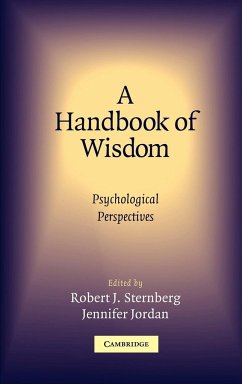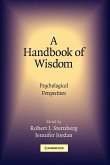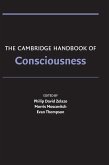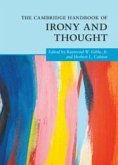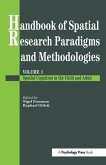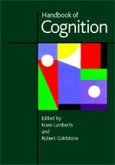Short description/annotation
This book gives an in-depth understanding of philosophical, psychological, and religious theories of wisdom.
Main description
A topic ignored in mainstream scientific inquiry for decades, wisdom is beginning to return to the place of reverence that it held in ancient schools of intellectual study. A Handbook of Wisdom explores wisdom's promise for helping scholars and lay people to understand the apex of human thought and behavior. At a time when poor choices are being made by notably intelligent and powerful individuals, this book presents analysis and review on a form of reasoning and decision-making that is not only productive and prudent, but also serves a beneficial purpose for society. A Handbook of Wisdom is a collection of chapters from some of the most prominent scholars in the field of wisdom research. Written from multiple perspectives, including psychology, philosophy, and religion, this book gives the reader an in-depth understanding of wisdom's past, present, and possible future direction within literature, science, and society.
Table of contents:
Foreword Monika Ardelt; Part I. Theories of Wisdom Across Time, Culture, and Peoples: 1. Wisdom in history James E. Birren and Cheryl M. Svensson; 2. Cultural foundations of wisdom: an integrated developmental approach Masami Takahashi and Willis F. Overton; 3. Philosophical theories of wisdom Lisa M. Osbeck and Daniel N. Robinson; 4. From the inside out: people's implicit theories of wisdom Susan Bluck and Judith Glück; 5. The psychology of wisdom: theoretical and empirical challenges Ute Kunzmann and Paul B. Baltes; Part II. The Development of Wisdom Across the Lifespan: 6. Young and growing wiser: wisdom during adolescence and young adulthood M. J. Richardson and M. Pasupathi; 7. The quest for wisdom in adulthood: a psychological perspective Jennifer Jordan; Part III. Wisdom and the Person: 8. Wisdom and personality Ursula M. Staudinger, Jessica DÖrner and Charlotte Mickler; 9. The role of emotions in the development of wisdom Mihaly Csikszentmihalyi and Jeanne Nakamura; Part IV. Wisdom in Society: 10. Morality, ethics, and wisdom Joel J. Kupperman; 11. Crossing boundaries to generative wisdom: an analysis of professional work Jeffrey L. Solomon, Paula Marshall and Howard Gardner; 12. Wisdom in public policy Lloyd S. Etheredge; Part V. The Absence of Wisdom: 13. Foolishness Robert J. Sternberg; Discussion Warren Brown.
This book gives an in-depth understanding of philosophical, psychological, and religious theories of wisdom.
Main description
A topic ignored in mainstream scientific inquiry for decades, wisdom is beginning to return to the place of reverence that it held in ancient schools of intellectual study. A Handbook of Wisdom explores wisdom's promise for helping scholars and lay people to understand the apex of human thought and behavior. At a time when poor choices are being made by notably intelligent and powerful individuals, this book presents analysis and review on a form of reasoning and decision-making that is not only productive and prudent, but also serves a beneficial purpose for society. A Handbook of Wisdom is a collection of chapters from some of the most prominent scholars in the field of wisdom research. Written from multiple perspectives, including psychology, philosophy, and religion, this book gives the reader an in-depth understanding of wisdom's past, present, and possible future direction within literature, science, and society.
Table of contents:
Foreword Monika Ardelt; Part I. Theories of Wisdom Across Time, Culture, and Peoples: 1. Wisdom in history James E. Birren and Cheryl M. Svensson; 2. Cultural foundations of wisdom: an integrated developmental approach Masami Takahashi and Willis F. Overton; 3. Philosophical theories of wisdom Lisa M. Osbeck and Daniel N. Robinson; 4. From the inside out: people's implicit theories of wisdom Susan Bluck and Judith Glück; 5. The psychology of wisdom: theoretical and empirical challenges Ute Kunzmann and Paul B. Baltes; Part II. The Development of Wisdom Across the Lifespan: 6. Young and growing wiser: wisdom during adolescence and young adulthood M. J. Richardson and M. Pasupathi; 7. The quest for wisdom in adulthood: a psychological perspective Jennifer Jordan; Part III. Wisdom and the Person: 8. Wisdom and personality Ursula M. Staudinger, Jessica DÖrner and Charlotte Mickler; 9. The role of emotions in the development of wisdom Mihaly Csikszentmihalyi and Jeanne Nakamura; Part IV. Wisdom in Society: 10. Morality, ethics, and wisdom Joel J. Kupperman; 11. Crossing boundaries to generative wisdom: an analysis of professional work Jeffrey L. Solomon, Paula Marshall and Howard Gardner; 12. Wisdom in public policy Lloyd S. Etheredge; Part V. The Absence of Wisdom: 13. Foolishness Robert J. Sternberg; Discussion Warren Brown.

